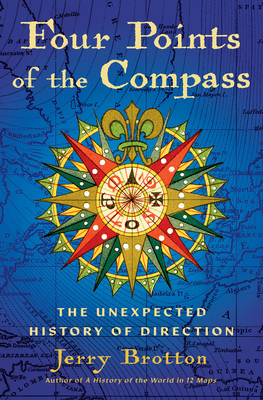Four Points of the Compass: The Unexpected History of Direction

Four Points of the Compass: The Unexpected History of Direction
From the New York Times bestselling author of A History of the World in 12 Maps, this is the revelatory history of the four cardinal directions that have oriented and defined our place on the globe for millennia
North, south, east, and west: almost all societies use these four cardinal directions to orientate themselves and to understand who they are by projecting where they are. For millennia, these four directions have been foundational to our travel, navigation, and exploration, and are central to the imaginative, moral, and political geography of virtually every culture in the world. Yet they are far more subjective--and sometimes contradictory--than we might realize.
Four Points of the Compass takes us on a journey of directional discovery. Societies have understood and defined directions in very different ways based on their locations in time and space. Historian Jerry Brotton reveals why Hebrew culture privileges east; why Renaissance Europeans began drawing north at the top of their maps; why early Islam revered the south; why the Aztecs used five color-coded cardinal directions; and why no societies, primitive or modern, have ever orientated themselves westwards. In doing so, politically-loaded but widely used terms such as the "Middle East," the "Global South," the "West Indies," the "Orient," and even the "western world" take on new meanings. Who decided on these terms and what do they mean for geopolitics? How have directions like "east" and "west" taken on the status of cultural identities--or more accurately stereotypes?
Yet today, because of GPS capability, cardinal points are less relevant. Online, we place ourselves at the center of the map as little blue dots moving across geospatial apps; we have become the most important compass point, though in the process we've disconnected ourselves from the natural world. Imagining what future changes technology may impose, Jerry Brotton skillfully reminds us how crucial the four cardinal directions have been to everyone who has ever walked our planet. For anyone interested in history, geography, or surprising new ways to think about the world at large, Four Points of the Compass will be a stimulating experience.
PRP: 167.40 Lei
Acesta este Prețul Recomandat de Producător. Prețul de vânzare al produsului este afișat mai jos.
133.92Lei
133.92Lei
167.40 LeiLivrare in 2-4 saptamani
Descrierea produsului
From the New York Times bestselling author of A History of the World in 12 Maps, this is the revelatory history of the four cardinal directions that have oriented and defined our place on the globe for millennia
North, south, east, and west: almost all societies use these four cardinal directions to orientate themselves and to understand who they are by projecting where they are. For millennia, these four directions have been foundational to our travel, navigation, and exploration, and are central to the imaginative, moral, and political geography of virtually every culture in the world. Yet they are far more subjective--and sometimes contradictory--than we might realize.
Four Points of the Compass takes us on a journey of directional discovery. Societies have understood and defined directions in very different ways based on their locations in time and space. Historian Jerry Brotton reveals why Hebrew culture privileges east; why Renaissance Europeans began drawing north at the top of their maps; why early Islam revered the south; why the Aztecs used five color-coded cardinal directions; and why no societies, primitive or modern, have ever orientated themselves westwards. In doing so, politically-loaded but widely used terms such as the "Middle East," the "Global South," the "West Indies," the "Orient," and even the "western world" take on new meanings. Who decided on these terms and what do they mean for geopolitics? How have directions like "east" and "west" taken on the status of cultural identities--or more accurately stereotypes?
Yet today, because of GPS capability, cardinal points are less relevant. Online, we place ourselves at the center of the map as little blue dots moving across geospatial apps; we have become the most important compass point, though in the process we've disconnected ourselves from the natural world. Imagining what future changes technology may impose, Jerry Brotton skillfully reminds us how crucial the four cardinal directions have been to everyone who has ever walked our planet. For anyone interested in history, geography, or surprising new ways to think about the world at large, Four Points of the Compass will be a stimulating experience.
Detaliile produsului










